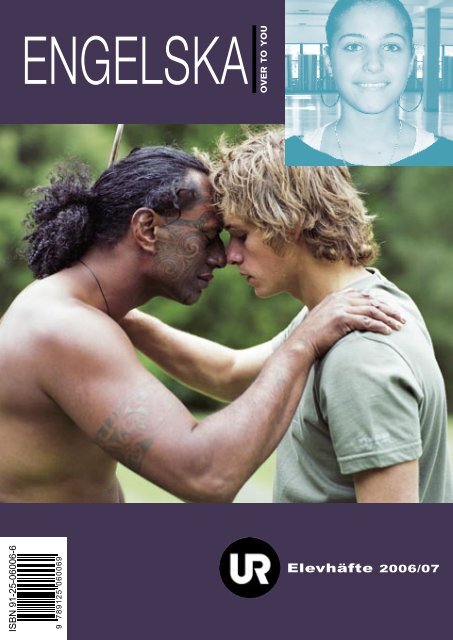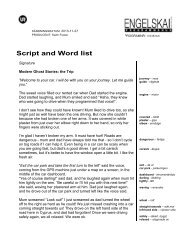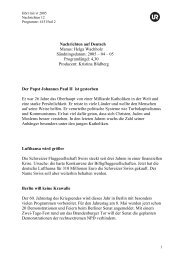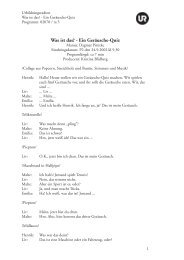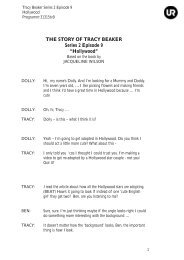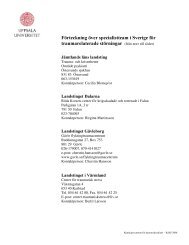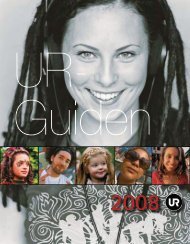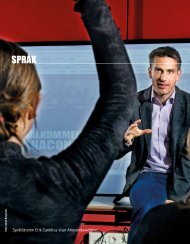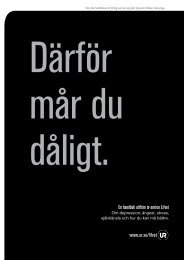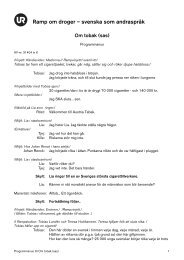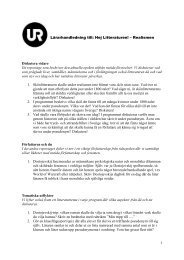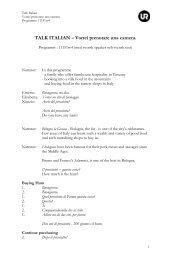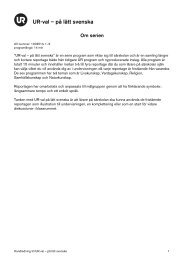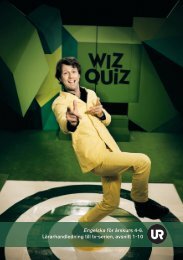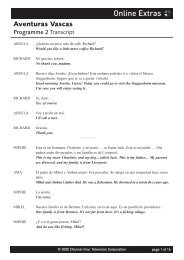Create successful ePaper yourself
Turn your PDF publications into a flip-book with our unique Google optimized e-Paper software.
ISBN 91-25-06006-6<br />
<strong>ENGELSKA</strong><br />
9 789125 060069<br />
OVER TO YOU<br />
Elevhäfte 2006/07<br />
1
Pop Quiz<br />
New Zealand<br />
Reality Radio<br />
Newsreel 2<br />
Pop Quiz 4<br />
Close View<br />
The Kiwi Hunt 6<br />
Hip Hop Aotearoa 8<br />
Welcome to the Marae! 10<br />
Royal Canadian Air Cadets 12<br />
Education for all? 14<br />
English Dialects 16<br />
Reality Radio<br />
Innehåll<br />
Introduction 18<br />
Beauty 20<br />
Identity 22<br />
Respect 24<br />
Future 26<br />
Suicide and Depression 28<br />
Stress 29<br />
Computer Games 30<br />
Science Fiction 31<br />
Born Wild 32<br />
Extra 34<br />
Reef Route 66 38<br />
New Zealand – The Road Trip 40<br />
Ed Stone is Dead 42<br />
Frieda: a follow up 44<br />
Living Room 46<br />
Sändningstiderna fi nns<br />
längst bak i lärarhäftet.<br />
1
2<br />
Newsreel<br />
The news in easy-to-understand English.<br />
Science and celebrities, big business and big battles,<br />
politics and pop music: somewhere in the world,<br />
a news story breaks every minute of every day.<br />
Hear the stories behind the headlines on Newsreel,<br />
our regular English language news show that keeps<br />
you up-to-date on the latest news from around the<br />
world.
C H R I S T I N E DEMSTEADER<br />
celebrity<br />
kändis<br />
headline<br />
rubrik<br />
up-to-date<br />
uppdaterad<br />
3
4<br />
Pop Quiz: Celebrities<br />
In North America, the term “pop quiz” makes most students very nervous, as<br />
it’s usually a little test that the teacher produces to find out how much you remember<br />
(or don’t) about what you’ve been studying. They’re handed out when you least<br />
expect it, and so there’s no time to prepare! But in England, quizzes are always<br />
about fun…<br />
So it’s time to put your gossip mags away, as we’re going to test your knowledge<br />
of who’s who in the world of music, screen and sport! Kate Winslet? Ne-Yo? Who<br />
knows: because the name’s the game as we introduce our new Pop Quiz, this time<br />
on celebrities! So get your pencils out and your thinking caps on, and find out who<br />
knows most about the stars!
gossip skvaller<br />
mags magazines<br />
screen duk (dvs bio)<br />
5
6<br />
Close View 1<br />
The Kiwi Hunt<br />
Close View is a series of 15-minute English-language<br />
documentaries that take a closer look at the activities<br />
and issues that interest young people in the Englishspeaking<br />
world. In this series, we cross the oceans<br />
from New Zealand to Canada to meet a host of interesting<br />
people, from young ecologists to rap artists and<br />
air-force cadets. Join us on Close View and learn a little<br />
bit more about what other teenagers are up to and into!<br />
New Zealand’s flora and fauna<br />
is endangered. The reason? Mammals.<br />
Originally, there was not a single<br />
mammal on either of the islands; now,<br />
however, all the dogs, marsupials, rats,<br />
and weasels that the European settlers<br />
brought with them have started to<br />
wipe out native plants and animals: 24<br />
species are already extinct.<br />
To help stop this trend, a team of conservationists<br />
have built a 2.8 km fence<br />
around part of North Island’s Mount<br />
Maungatautari to keep all mammals<br />
away from the area. Once this safe,<br />
mammal-free environment has been<br />
cordoned off, native birds such as kiwi,<br />
endangered frogs and other plants and<br />
animals will be reintroduced.<br />
issues<br />
frågor<br />
ocean<br />
världshav<br />
host of<br />
många, en hel del<br />
ecologist<br />
ekolog<br />
cadet<br />
kadett
“You know, New Zealanders call themselves<br />
kiwis, so if we were to let it go extinct, what’s<br />
that saying about us? That’s the thing we want<br />
to protect, because we identify with these birds.<br />
Ground-dwelling, walks on two legs, can’t fly,<br />
and loves its food…so, typical kiwi!”<br />
Join us on Close View as we accompany a group of students<br />
from St Peter’s School in Cambridge on a trip to the mountain<br />
to help with the project. Our guide is Jillana Robertson from the<br />
Maungatautari Ecology Island Trust, who is busy trying to find<br />
one of the kiwis so that she can weigh it and measure its beak to<br />
make sure it is growing healthily. Kiwis are very shy birds – will<br />
the students ever get to see one?<br />
FA C T BOX<br />
• Kiwis are flightless birds<br />
that are native only to<br />
New Zealand.<br />
• Kiwis are nocturnal, and<br />
very shy.<br />
• Kiwis have no tail, and<br />
tiny wings that are pretty<br />
much useless.<br />
• Kiwis have whiskers.<br />
• Kiwis mate for life and<br />
lay eggs that weight<br />
0.5 kg. That’s like an<br />
average woman giving<br />
birth to a 13 kg baby.<br />
• Kiwis are the only<br />
birds that burrow in the<br />
ground.<br />
• They are very long lived<br />
– if they aren’t killed<br />
during their first few<br />
months, they can live for<br />
up to forty years!<br />
endangered<br />
utrotningshotad<br />
settler<br />
nybyggare<br />
mammal<br />
däggdjur<br />
marsupial<br />
pungdjur<br />
extinct<br />
utdöd<br />
weasel<br />
vessla<br />
conservationist<br />
naturvårdare<br />
cordon off<br />
avspärra<br />
witness<br />
vittna<br />
7
8<br />
Close View 2<br />
Hip Hop Aotearoa<br />
“<br />
When you do<br />
rap stuff in<br />
Maori, they<br />
don’t want to<br />
hear it. This<br />
country is that<br />
white.<br />
”<br />
In this programme, Close View talks to two very different Maori hip hop<br />
artists about their music and the Maori culture.<br />
Te Kupu (aka D Word, aka Dean Hapeta) is a member of the Upper Hutt<br />
Posse, New Zealand’s first ever hip hop group. They released their first single<br />
E tu (which means “stand”) in 1988, and rap in both Maori and English. Te<br />
Kupu talks about the 20-year history of New Zealand hip hop, and discusses<br />
how he feels Maoris and their music are treated by white New Zealanders.<br />
Te Kupu writes music to make people think.
Crunk artist MC Slopemist (aka Chevy Rameka) has different views<br />
about rap and the infl uences that American hip hop culture has had<br />
on Maori music. Many of New Zealand’s hip hop artists are Maori,<br />
and MC Slopemist talks about how much the music and fashion<br />
refl ects the Maori’s cultural heritage.<br />
MC Slopemist writes music to make people bounce.<br />
“<br />
We tend to pay the tribes<br />
homage, because without<br />
them, we wouldn’t<br />
be here. Hip hop was a<br />
black movement thing,<br />
so Maoris and Pacific<br />
Islanders tend to have a<br />
feel for hip hop because<br />
the same sort of struggle<br />
happens in the States.<br />
We tend to have our own<br />
sort of American scene<br />
in New Zealand,<br />
I suppose.<br />
”<br />
Fr om E t u: :<br />
Te Rangihaeata * believes in holding<br />
land / Against the foe, yo, the British<br />
man / To him lands essential to the<br />
mana of the chief / And in the Hutt<br />
there were some hardcore feats /<br />
In 1846 in the Hutt Valley I said /<br />
Fighting broke out bet ween the British<br />
and the Maori /And more than one<br />
settler on disputed land / Was killed<br />
when the Maori fought the British<br />
Plan /Cause white rule and injustice<br />
go hand in hand / So against that is<br />
where we stand / Don’t forget those<br />
who’ve fought before / Our struggle<br />
continues more and more / Yeah it’s a<br />
struggle, it’s a struggle / The system’s<br />
got us in a muddle / So strive to get<br />
outta this puddle.<br />
* A fierce Maori chief<br />
aka<br />
also known as<br />
release<br />
släppa<br />
influence<br />
inflytande<br />
reflect<br />
återspegla<br />
heritage<br />
arv<br />
pay homage<br />
ge erkännande till/hylla<br />
9
Close View 3<br />
Welcome to the Marae!<br />
The Marae is a sacred place for the Maori. Generally<br />
found outside the communal meeting house,<br />
the Marae forms the basis of traditional life for the<br />
Maori people and is where community events like<br />
weddings, funerals, and official functions take place.<br />
Join Close View as we meet three people who are<br />
doing very different things to keep Maori culture<br />
alive. First up is Rotokiwi Manihera, a tourist guide at<br />
Tamaki Maori Village. He talks about what happened<br />
to the Maori culture after European settlement, and<br />
what it’s like being a Maori today.<br />
10<br />
Then we meet Rokura Hohepa, a young actress<br />
currently involved in a play addressing the history<br />
of New Zealand (or Aotearoa) from the arrival of the<br />
Maori 600 years ago to the present.<br />
Rapper Te Kupu (whom we met in the previous programme)<br />
has a different attitude to Maori history and<br />
the place of Maori culture in New Zealand society. In<br />
this programme, he talks more about the meaning<br />
of his music and what he thinks about many Maori<br />
people today.
FA C T BOX<br />
The Maori migrated from<br />
Polynesia to New Zealand<br />
in about A.D. 800. In 1840,<br />
their chieftains signed a<br />
treaty with Britain, handing<br />
over sovereignty to Queen<br />
Victoria. Although the Maori<br />
had kept their rights to the<br />
land, the British started to<br />
colonise the country in that<br />
same year. The Maori tried<br />
to fight off the British for a<br />
generation, but eventually<br />
they were all but wiped out.<br />
After a period of assimilation<br />
in the early 20th Century,<br />
much of traditional Maori life<br />
was lost, but since the 1970s<br />
Maori culture, language and<br />
custom has been more and<br />
more widely celebrated. The<br />
Maori now make up around<br />
10% of the population and<br />
live on the very north-western<br />
tip of North Island and the<br />
east coast.<br />
sacred<br />
helig<br />
wedding<br />
bröllop<br />
funeral<br />
begravning<br />
address<br />
ta upp ett ämne<br />
settlement<br />
bosättning<br />
11
12<br />
Close View 4<br />
Royal Canadian Air Cadets<br />
In this edition of Close View, we’re in Ontario,<br />
Canada, visiting the Royal Canadian Air Cadets.<br />
The Cadets is a special training programme for<br />
young people between the ages of 12 and 18. During<br />
the programme, you’ll hear what some of the teenagers<br />
have to say about being a member.<br />
One of them, 15-year-old Wafa is in her first year and<br />
one of the few girls in the Cadets. For her, the Cadets<br />
have had a big impact on her and her community. Is it<br />
a positive one? Does she actually like being in the<br />
Cadets? Robert, 17, is more interested in the discipline<br />
of the Cadets, while Scott, 15, discusses what<br />
it’s like being in charge of a whole squadron of 45.<br />
Can they cope? Do they enjoy the life of drills and<br />
hard work? Listen to Close View and find out what<br />
some Canadian youngsters feel about the military life.
“<br />
A lot of self-discipline<br />
is involved,<br />
and it takes a<br />
lot of work to be<br />
good at the drill.<br />
You always have<br />
to think when<br />
you’re doing it.<br />
It’s 90 percent<br />
mental, 10 per<br />
cent physical.<br />
”<br />
“<br />
When I came here,<br />
there were ten<br />
girls only in the<br />
squadron, and my<br />
friends said, ‘Why<br />
are you doing<br />
that? It’s for guys,<br />
it’s not for girls!’<br />
”<br />
FA C T BOX<br />
Cadets can choose between<br />
three basic programmes:<br />
• The Royal Canadian<br />
Sea Cadets<br />
• The Royal Canadian<br />
Army Cadets<br />
• The Royal Canadian<br />
Air Cadets<br />
The Cadets are not part of<br />
the armed forces, and no<br />
one is expected to join the<br />
military afterwards. What<br />
the programme does do<br />
is to offer young people a<br />
chance to take part in a variety<br />
of challenging, physical<br />
activities, and encourage<br />
them to become active and<br />
responsible members of their<br />
community.<br />
impact<br />
inverkan<br />
community<br />
samhälle<br />
discipline<br />
disciplin<br />
squadron<br />
skvadron/militär grupp<br />
cope<br />
orka med<br />
13
James Wendy Pierre<br />
14<br />
Close View 5<br />
Education for all?<br />
Wendy, James and Pierre all go to Matthews<br />
Hall, a private school in Ontario, Canada. They enjoy<br />
their school; the classes are small, the students<br />
are motivated, and the teachers have time to give<br />
them each the personal attention they need. Private<br />
schools like Matthews Hall have an average of 14<br />
students to every teacher.<br />
“It’s not fair that they can get a better<br />
education just because they’re willing to<br />
pay more money.”<br />
Daniel<br />
Harrison and Daniel, go to normal state schools,<br />
where the classrooms are larger and so anonymous<br />
that the teachers hardly even know who’s who. Some<br />
of the students are not very engaged in the lessons,<br />
and even more aren’t interested in extra-curricular<br />
activities like school dances. Public schools like theirs<br />
have an average of 35 students to every teacher.<br />
Harrison
Wendy, James, Pierre, Harrison and Daniel talk about their<br />
schools and the pros and cons of the public and private school<br />
systems. Even though private schools have more money, better<br />
technology, and more interesting clubs for the students to join,<br />
they are also more strictly disciplined. But is the education they<br />
provide superior? And which kind of school gives students a better<br />
start in life?<br />
Listen to Close View and find out what these Canadian school<br />
kids think: can money really can buy you a better education – or<br />
is it all just a matter of attitude?<br />
“In a private school, it’s<br />
much easier to improve<br />
on the things that you’re<br />
not so good at.”<br />
NOTE<br />
In American English, a public school is a school thatʼs open<br />
to everyone. In British English, a public school is a very exclusive<br />
private school like Eton or Harrow; schools that are<br />
open to everyone are called comprehensive or state schools.<br />
FA C T BOX<br />
Matthews Hall started life<br />
as a nursery school in 1918<br />
for five boys and one girl. It<br />
is now a large independent<br />
school with facilities that<br />
include a drama studio, a<br />
performing arts studio, a<br />
visual arts studio, and a<br />
Peace Garden.<br />
The Matthews Hall school<br />
motto is Debeo Pussum<br />
Volo: I must, I can, I will.<br />
motivated motiverad<br />
personal personlig<br />
attention uppmärksamhet<br />
anonymous anonym<br />
engaged engagerad<br />
extra-curricular verksamheter<br />
activities utanför schemat<br />
pros and cons för- och nackdelar<br />
strictly strängt<br />
disciplined disciplinerad<br />
superior överlägsen<br />
exclusive exklusiv<br />
15
16<br />
English Dialects<br />
“Do you speak English?” is a question that’s<br />
probably asked millions of times a day around the<br />
world. English remains the international language of<br />
communication – just think of the internet!<br />
Yet how English sounds can be very different. You’re<br />
probably familiar with the Queen’s English – but how<br />
about Cockney, or Scottish, or the many shades of<br />
dialect in between?<br />
Join us in our new series as we vox pop people all<br />
over the United Kingdom and find out how different<br />
the same language can sound and why.
FA C T BOX<br />
Linguistic imperialism?<br />
Is English taking over the world? If<br />
you look at how much the number<br />
of people speaking English has<br />
risen over the centuries, you might<br />
be tempted to think it is!<br />
16th century: 4 million<br />
17th century: 6 million<br />
18th century: 8 million<br />
19th century: 40 million<br />
20th century: 120 million<br />
21st century: 1 billion (estimate)<br />
familiar<br />
bekant<br />
shade<br />
nyans<br />
vox pop<br />
Latin for “Voice of<br />
the People”<br />
tempted<br />
frestad<br />
17
18<br />
Reality Radio<br />
Introduction<br />
Get real.<br />
Real thoughts and real questions by real people<br />
talking about real things. The radio programme<br />
that dares to consider the realities of life.<br />
Who am I? What is beauty? Why is respect so important? Reality Radio continues to delve<br />
into issues that matter most to Swedish teenagers. The future, identity, stress: whatever the<br />
theme, you’ll get a personal, serious and sometimes funny look at what makes us who we are.<br />
Reality Radio explores the topic at hand from different angles through a set of three themerelated<br />
programs:<br />
• FACT FIVE - Five minutes of factual insight<br />
• ROUGH CUTS - A series of English language diaries recorded by teens for teens<br />
• TAKE FIVE – Five minutes of radio drama<br />
And as the Take Five theatre comes to a close, Reality Radio 2007 launches…<br />
• SCIENCE RADIO – Ten minutes with the experts<br />
dare<br />
våga<br />
delve into<br />
utforska<br />
gender<br />
kön<br />
angle<br />
infallsvinkel<br />
launch<br />
lansera
This se asonʼs topics:<br />
Beauty<br />
Identity<br />
Respect<br />
Future<br />
Suicide and Depression<br />
Stress<br />
Computer Games<br />
Science Fiction<br />
19
20<br />
Reality Radio<br />
Beauty<br />
Beauty is an<br />
ideal that<br />
dominates most<br />
societies, but<br />
how can you<br />
define something<br />
so subjective?<br />
FACT FIVE<br />
To get a better understanding of what people around the<br />
world think about beauty, Dr. Nancy Etcoff of Harvard<br />
University helped conduct a global study called “The Real<br />
Truth About Beauty”, which asked 3,200 women in 10 different<br />
countries about what ‘beauty’ means for them.
TAKE FIVE<br />
After hearing Sanna get sick<br />
in the bathroom at school,<br />
Fern expresses concern and<br />
finds herself suddenly confronted<br />
with something more<br />
serious than just an upset<br />
stomach: Sanna has an eating<br />
disorder. Fern bravely speaks<br />
with Sanna only to learn how<br />
deeply rooted her troubles<br />
with self-esteem are.<br />
“Everything has its beauty<br />
but not everyone sees it.”<br />
CONFUCIOUS, CHINESE PHILOSOPHER & REFORMER<br />
(551 BC - 479 BC)<br />
ROUGH CUTS<br />
Alexandra Eisenstein (18)<br />
All the advertisements full of<br />
‘beautiful people’ do have an<br />
effect on each of us. In her<br />
radio diary, Alexandra tells<br />
us what she thinks about the<br />
power of consumer society<br />
and the importance of developing<br />
a strong sense of self.<br />
“Beauty is in all of us and we<br />
have to release it.”<br />
beauty skönhet<br />
dominate dominera,<br />
define definiera<br />
subjective subjektiv, personligt färgad<br />
conduct genomföra<br />
concern bekymmer<br />
eating disorder ätstörning<br />
confront konfrontera<br />
self-esteem självkänsla<br />
21
22<br />
Reality Radio<br />
Identity<br />
Identity consists of characteristics that not only relate us to<br />
our social surroundings but also make us unique. Reality Radio<br />
sheds light on the fundamental question: Who am I?<br />
FACT FIVE<br />
If you think that multiple identities are only for psychopaths and<br />
international spies, think again! Listen as Dr. Charlotte Engblom,<br />
an expert on identity, explains how each of us has several identities<br />
– and that who we are depends on where we are. “People<br />
can have so many different identities depending on what they are<br />
doing. They can be a football player, a student, a friend.”
ROUGH CUTS<br />
Olivia Arbouz (16) and Joel Sida-Hedström (16).<br />
Where are you from? A simple question with<br />
not-so-simple answers for many of us. Olivia<br />
and Joel describe what’s it’s like to feel “in<br />
between” cultures – born in Sweden, yet with<br />
strong family ties to other parts of the world.<br />
“To be idle requires a strong<br />
sense of personal identity.”<br />
ROBERT LOUIS STEVENSON,<br />
SCOTTISH AUTHOR (1850 - 1894)<br />
TAKE FIVE<br />
After a year in Sweden, Paul is<br />
confronting some of the challenges<br />
of living in another country. Now that<br />
some of the charm has worn off, he<br />
finds that the cultural differences<br />
in his everyday life are starting to<br />
become a problem for him. Can his<br />
Swedish friends relate?<br />
identity identitet<br />
in-between mittemellan<br />
family ties familjeband<br />
categorise kategorisera<br />
psychopath psykopat<br />
spy spion<br />
challenge utmaning<br />
wear off gå över<br />
23
24<br />
Reality Radio<br />
Respect<br />
Respect is a fundamental part of every<br />
relationship and something we all<br />
want and need, but how do we earn it?<br />
FACT FIVE<br />
Respect is something we all want and need,<br />
but some people are born with it while others<br />
have to fight for it. Why is it that the colour of<br />
your skin, your gender and your class often<br />
make more of a difference than who you actually<br />
are as a person? Journalist Carmilla Floyd<br />
tells us about girl gangs in the US and how<br />
and why they fight for respect.
ROUGH CUTS<br />
Maria Lisa Carlsson (16).<br />
What is respect? How does one<br />
earn respect? Maria Lisa talks about<br />
respect and disrespect, and how<br />
respect is often confused with fear.<br />
Self-respect, she concludes, is what<br />
counts. “Listen to yourselves, and<br />
respect yourselves: there’s nothing<br />
more important in the world.”<br />
TAKE FIVE<br />
Erik continues to disrespect Teresa, sometimes expressing<br />
an interest and at other times dismissing her. What is his problem?<br />
How long is she going to put up with this nonsense?<br />
“Let every man be respected<br />
as an individual and<br />
no man idolized.”<br />
ALBERT EINSTEIN,<br />
US (GERMAN-BORN) PHYSICIST (1879 - 1955)<br />
respect respekt, aktning<br />
gender kön<br />
gang liga, gäng<br />
confuse blanda ihop<br />
fear rädsla<br />
counts betyda något, spela roll<br />
dismiss avvisa<br />
25
26<br />
Reality Radio<br />
Future<br />
The future remains a great unknown, holding both fears and<br />
possibilities for each of us.<br />
Do you determine your future or is it written in the stars?<br />
FACT FIVE<br />
What does the future hold for mankind? And what will<br />
happen to me? To answer these questions, people of all<br />
cultures and all ages have turned to history, to religion and<br />
to fortune-tellers. Can anyone ever know? Perhaps there are<br />
people out there who really can see into the future…
TAKE FIVE<br />
ROUGH CUTS<br />
Are you worried about the<br />
future? Do you wonder<br />
what will happen with bird<br />
flu, climate change, or<br />
the population explosion?<br />
Perhaps you’re more concerned<br />
about your career.<br />
Listen to a group of teenagers<br />
as they talk about<br />
their hopes and fears for<br />
the future.<br />
Do you lie awake at night pondering about the future? Does your imagination<br />
leap forward in time to what your life might be like when you are older? Will you<br />
have a family? Or do you only dare to think of the next couple of days, weeks or<br />
months because anything further is a jumbled mess of uncertainty?<br />
“The future belongs to those<br />
who prepare for it today.”<br />
MALCOLM X, U.S. BLACK NATIONALIST LEADER (1925 - 1965)<br />
future framtiden<br />
mankind mänskligheten<br />
fortune-teller spåman, spåkvinna<br />
worried orolig<br />
ponder fundera<br />
dare våga<br />
jumbled mess<br />
uncertainty<br />
en enda röra<br />
ovisshet 27
28<br />
Reality Radio<br />
Suicide and Depression<br />
Is being sad different<br />
from being depressed?<br />
Everyone gets down<br />
from time to time; the<br />
secret is to realise that<br />
things can change, and<br />
that there are people<br />
there to help.<br />
FACT FIVE<br />
In some societies committing suicide is a sin while in others it can be considered<br />
honourable. This complex topic will be explored and discussed within a historical<br />
and cultural perspective.<br />
ROUGH CUTS<br />
Bernard Bergström (19) and<br />
Annika Davén (18).<br />
In this radio discussion, Bernard and Annika<br />
debate whether suicide is wrong and selfish,<br />
or a release from a life that you never chose<br />
to have in the first place. Is there a greater<br />
purpose to life or is it your own to do what<br />
you want with?<br />
SCIENCE RADIO<br />
What happens in the body when we are depressed? Do anti-depressant pills really<br />
work? What’s the link between depression and suicide? Science Radio talks to the<br />
experts to find out what happens in the brain when people get depressed, and what<br />
can make people want to end their own lives.
Though considered a part of daily life,<br />
stress takes its toll. Why do so many of<br />
us have a hard time adopting the “don ̀t<br />
worry, be happy” philosophy?<br />
FACT FIVE<br />
Why is everyone so stressed out? Is<br />
it really necessary? Are people more<br />
stressed today than they used to be?<br />
Are teens more stressed than people<br />
of other ages?<br />
ROUGH CUTS<br />
Karin Enström (15).<br />
“Some people say<br />
that teenagers who<br />
say they’re stressed<br />
just don’t know what<br />
they’re talking about.”<br />
Listen to Karin, as she<br />
talks about stress,<br />
her teenage friends<br />
with ulcers and insomnia,<br />
and some of the things that<br />
make life stressful for young people.<br />
SCIENCE RADIO<br />
What happens in the body, physiologically,<br />
when we are stressed? What can be<br />
done to reduce stress hormones? Medical<br />
expert Sam Sears, at the University<br />
of Florida, gives expert advice on how to<br />
avoid too much negative stress.<br />
ulcer<br />
magsår<br />
insomnia<br />
sömnlöshet<br />
takes its toll<br />
har ett högt pris,<br />
kräver sin tribut<br />
avoid<br />
undvika<br />
Reality Radio<br />
Stress<br />
29
30<br />
Reality Radio<br />
Computer Games<br />
FACT FIVE<br />
As computer games become more complex<br />
and realistic, thousands of people<br />
are joining in, but is it all fun and games?<br />
addicted<br />
beroende<br />
benefit<br />
förmån<br />
waste of time<br />
bortkastad tid<br />
aggressive<br />
aggressiv<br />
Games have always been a popular form of entertainment (think cards,<br />
marbles, or bingo). Are computer games any better or worse?<br />
SCIENCE RADIO<br />
As the gaming industry<br />
posts record sales, concerned<br />
parents fear that<br />
their children could become<br />
antisocial and aggressive<br />
from spending too much<br />
time playing computer<br />
games. According to gaming<br />
expert Jane Douglas<br />
it’s not all bad. In fact, the<br />
neurological reactions in<br />
the brain during play might<br />
actually make us smarter<br />
and improve our memory.<br />
ROUGH CUTS<br />
Elin Olsson (18) and<br />
Maria Joelsson (18).<br />
8 million people in the US are addicted<br />
to their computers. Elin and Maria talk<br />
about the possible problems and benefits<br />
of computers, and whether they are<br />
a waste of time or good for the mind.<br />
Perhaps paintball is better?
Reality Radio<br />
Science Fiction<br />
Science fiction books and films allow us to imagine galaxies far, far way…<br />
FACT FIVE<br />
Who dreams up science fiction plots? And who are the sci-fi fans? An in-depth look at<br />
the science fiction genre.<br />
ROUGH CUTS<br />
Annette Schwela-Johansson (18) and<br />
Jenny Östman (18).<br />
Some things that were once considered<br />
science fiction have become a reality<br />
today. As Annette and Jenny say, science<br />
fiction isn’t just about outer space,<br />
it’s also about predicting the future and<br />
looking back into the past. It’s good to<br />
stimulate the imagination. “Too many<br />
people take life too seriously.” And what<br />
about that gnome in the bathroom…<br />
SCIENCE RADIO<br />
Science fiction stretches the imagination<br />
and makes us wonder: Will humans ever<br />
travel with the speed of light? Teleport<br />
themselves? Colonize Mars? Will intelligent<br />
machines be a part of the future? Top U.S.<br />
physicist Pierre Ramond reveals that some<br />
seemingly farfetched ideas could actually<br />
become a reality in the future.<br />
“Politicians should read<br />
science fiction, not<br />
westerns and<br />
detective stories.”<br />
outer space<br />
yttre rymden<br />
plot<br />
intrig, handling<br />
predict<br />
förutsäga<br />
far-fetched<br />
långsökt<br />
31<br />
ARTH<strong>UR</strong> C. CLARKE (1917-),<br />
31<br />
BRITISH AUTHOR OF SCIENCE FICTION AND
32<br />
Born Wild<br />
Born Wild is a series of five-minute programmes that take<br />
a light-hearted look at the lives of baby animals.<br />
T H E BABOON<br />
lives in central Africa<br />
is the size of a dog<br />
weighs 40 kilos<br />
is very aggressive<br />
has large fangs<br />
lives in a group called a troop<br />
Puck the baboon<br />
is a baby baboon who likes to ride on his<br />
mother’s back.<br />
Tom the gnu<br />
is a baby gnu who<br />
lives on the<br />
African savannah.<br />
T H E GNU<br />
can run very fast<br />
is able to run 5 minutes after<br />
being born<br />
is vegetarian<br />
weighs 250 kilos<br />
x8<br />
sleeps on the ground in rows<br />
is also known as the wildebeest<br />
(“wild beast”)
Ricky the koala<br />
lives in a eucalyptus<br />
tree in Australia<br />
with his mother<br />
and big brother.<br />
T H E KOALA<br />
eats nothing but eucalyptus leaves<br />
eats 1.5 kilos of leaves a day<br />
sleeps 18 hours a day<br />
is a very good climber<br />
Also:<br />
Momo – the<br />
orangutang<br />
Rosie – the<br />
hyena<br />
Lili – the<br />
sea lion<br />
Mango – the<br />
zebra<br />
fangs<br />
huggtänder<br />
savannah<br />
savann<br />
wild<br />
vild<br />
gazelle<br />
gasell<br />
adulthood<br />
mogen ålder<br />
weighs 12 kilos and 5 grams at birth<br />
lives in a group called a colony<br />
Kikou the cheetah is a baby cheetah who lives in Tanzania with<br />
his mother and two sisters.<br />
T H E CHEETAH<br />
lives on the African<br />
savannah<br />
is the fastest of all big<br />
cats<br />
can run at over 110 km/h<br />
eats gazelles and<br />
antelopes<br />
usually dies before<br />
adulthood<br />
weighs 75 kilos<br />
33
34<br />
Extra<br />
Extra is the story of Annie and Bridget, two friends<br />
sharing a flat together in London. Their neighbour, Nick,<br />
is a frequent visitor to the flat – and by the way he looks<br />
at Bridget, it’s not just a bowl of sugar he’s after! Annie,<br />
however, fancies Nick, who doesn’t seem to notice her.<br />
And this is how it is until one day Bridget gets a letter<br />
from Hector, an old pen-friend in Argentina. It seems he’s<br />
coming over to visit – today! And this is where the fun<br />
starts, as their new friend, who doesn’t speak very good<br />
English, struggles to fit in with London life.<br />
x8
Hello,<br />
do you remember<br />
me? Seven years<br />
ago we was penpals.<br />
I speak English<br />
good now and I am<br />
coming to England.<br />
I would like to<br />
sleep with you. Do<br />
you have a bed for<br />
me?<br />
E P I S O D E 1<br />
Hector’s Arrival<br />
Bridget and Annie have<br />
a visitor, Hector, a<br />
good-looking guy from<br />
Argentina who can’t<br />
speak English too well.<br />
Nick is the boy next door<br />
who fancies Bridget and<br />
at fi rst doesn’t like the<br />
idea of a rival.<br />
E P I S O D E 2<br />
Hector Goes Shopping<br />
Hector needs some new clothes but is not sure what to buy or how to<br />
buy it. His new friends help, while Hector tries shopping on the internet<br />
with disastrous results.<br />
E P I S O D E 3<br />
Hector Has A Date<br />
Nick and Hector try to get a date on the internet. The plan backfi res<br />
when the girls see their advert and decide to put themselves up for a<br />
date – only they dress up in dog costumes and the boys get just a little<br />
confused.<br />
Bridget<br />
is the Queen of the<br />
flat. She loves her<br />
exercise bike, boys,<br />
and looking at herself<br />
the mirror.<br />
Annie<br />
is Bridget’s fl atmate.<br />
She is sweet, sometimes<br />
a little bit<br />
naughty and has a<br />
major crush on Nick.<br />
Nick<br />
lives across the hallway<br />
from Bridget<br />
and Annie. He is a<br />
little foolish, loves<br />
to have a laugh and<br />
has a major crush<br />
on Bridget.<br />
Hector<br />
Hector is from Argentina.<br />
He seems<br />
a bit of a nerd at<br />
first, and his taste in<br />
clothes is as poor as<br />
his English.<br />
35
Extra<br />
36<br />
E P I S O D E 4<br />
Hector Looks For a Job<br />
When Bridget invites her boss for dinner the boys think she needs protecting and decide<br />
to do the cooking so that they can keep an eye on him. Hector gets a job as a waiter and<br />
together they show Bridget that her boss is up to no good.<br />
E P I S O D E 5<br />
A Star Is Born<br />
Nick gets a mysterious acting job. Annie is obsessed with adverts and Hector starts to fall<br />
for her. He makes her a chocolate cake and Bridget gets seriously disappointed. It turns<br />
out that Nick’s new part is as a weather presenter.
E P I S O D E 6<br />
Bridget Wins The Lottery<br />
Bridget thinks she has won the lottery, but Hector has taken her winning ticket<br />
by mistake. Hector and Nick try to find it, but then Bridget discovers that her<br />
numbers were all upside down anyway.<br />
E P I S O D E 7<br />
The Twin<br />
Unknown to the others, Bridget has an identical twin sister who comes to visit.<br />
She may look the same but she behaves very differently. This causes a lot of<br />
confusion, especially when it seems that the twin fancies Nick.<br />
E P I S O D E 8<br />
The Landlady’s Cousin<br />
When their Landlady goes on holiday, she leaves her cousin in charge. Nick<br />
discovers that the cousin is actually rather glamorous and that she quite fancies<br />
him. Meanwhile Hector and Annie get close over a build-it-yourself shelving unit.<br />
share<br />
dela<br />
neighbour<br />
granne<br />
frequent<br />
flitig<br />
fancy<br />
vara förtjust i<br />
seem<br />
visa sig<br />
struggle<br />
kämpa<br />
naughty<br />
busig<br />
have a crush on<br />
vara småförälskad<br />
foolish<br />
töntig<br />
taste in clothes<br />
klädsmak<br />
poor<br />
undermålig<br />
disastrous<br />
katastrofal<br />
backfire<br />
misslyckas<br />
be up to no good<br />
ha ofog för sig<br />
mysterious<br />
mystisk<br />
obsessed<br />
besatt<br />
upside down<br />
upp och ner<br />
identical<br />
identisk<br />
confusion<br />
förvirring<br />
in charge of<br />
med ansvar för<br />
shelving unit<br />
hylla<br />
37
Reef Route 66<br />
The Colour Cycle<br />
One night a year, the corals of Australia’s Great Barrier Reef<br />
explode into the largest mass breeding event on the planet. Under<br />
the cover of darkness, a few days after a full moon in early summer,<br />
thousands upon thousands of coral simultaneously release their<br />
eggs and sperm into the water. All of this genetic material floats up<br />
to the surface where some of the eggs become fertilised, and the<br />
cycle of life begins again.<br />
This is the investigative journey of a young environmental scientist<br />
and an award-winning cameraman as they set out to record this<br />
amazing phenomenon—one of the most spectacular in the undersea<br />
kingdom. In addition to capturing the spawning of the coral, the<br />
film talks to leading scientists about some of the things that threaten<br />
the reef, from natural predators to global warming. Whether it’s information<br />
or beauty you want, this film promises to keep you entertained<br />
with it’s mixture of science and stunning underwater scenery.<br />
The Seven<br />
Natural<br />
Wonders<br />
of the<br />
World<br />
38<br />
Great Barrier Reef, Australia<br />
Victoria Falls, Zambia<br />
and Zimbabwe<br />
Grand<br />
Canyon,<br />
Arizona,<br />
USA
Harbor of<br />
Rio de Janeiro, Brazil<br />
Mount Everest,<br />
Nepal<br />
The Great<br />
Barrier Reef<br />
reef rev<br />
coral korall<br />
spawning leka, lägga rom<br />
breeding fortplantning<br />
larvae larver<br />
cycle of life livscykel<br />
predator rovdjur<br />
investigative undersökande<br />
spectacular imponerande<br />
stunning bedövande (vackert)<br />
Northern Lights<br />
AUSTRALIA<br />
FA C T BOX<br />
The Great Barrier Reef,<br />
composed of over 2,900<br />
reefs is the only living<br />
structure visible from<br />
outer space. It is the<br />
world’s largest coral reef<br />
ecosystem where thousands<br />
of species coexist,<br />
including approximately:<br />
• 359 of the 400 species<br />
of coral<br />
• 1,500 species of fish<br />
• 4,000 species of<br />
molluscs<br />
• 500 species of<br />
seaweed<br />
• 215 species of birds<br />
• 16 species of sea<br />
snake<br />
• 6 of the 7 species of<br />
sea turtle<br />
Paricutin Vulcano,<br />
Mexico<br />
39
40<br />
New Zealand<br />
The Road Trip<br />
Join us on a road trip down North Island, part of one<br />
of the most beautiful countries in the world. Comparable in<br />
size to Great Britain, Colorado or Japan, New Zealand has<br />
a population of only 4 million—making it one of the world’s<br />
least crowded countries. During our 15 minute journey, we<br />
will see breathtakingly beautiful landscapes with mountain<br />
chains, rolling pastures, sweeping coastlines, deep fjords<br />
and lush rainforests. We also take time to meet some kiwis<br />
of both the feathered and non-feathered kind.<br />
S T O P 1<br />
Auckland: We meet rapper Mc Slopemist,<br />
and visit Disruptive TV, a place for<br />
artists and rappers to hang out.<br />
FA C T BOX<br />
• According to legend, the great explorer<br />
Kupe discovered the islands and named<br />
them Aotearoa (The Land of the Long<br />
White Cloud).<br />
• The first European to see Aotearoa was<br />
Dutchman Abel Tasman (1642), who<br />
renamed it New Zealand after the Dutch<br />
province.<br />
• New Zealand is in the southern hemisphere,<br />
which means that winter there it<br />
is during June, July and August.<br />
• Its capital, Wellington is the southern-<br />
most capital city in the world. It’s as far<br />
south as Istanbul and Madrid are north!<br />
• The kiwi is the national bird of New Zealand,<br />
and the name many New Zealanders<br />
call themselves by.<br />
• New Zealand is a member of the British<br />
Commonwealth, and has the British<br />
Queen as its head of state, who is represented<br />
by a Governor General appointed<br />
for a five year term.<br />
• The major health hazards in New Zealand<br />
are sunburn, sunstroke and smoking.
North Island<br />
MOUNT MAUNGATAUTARI*<br />
ROTORUA<br />
South<br />
Island<br />
New Zealand<br />
comparable<br />
jämförbar<br />
crowded<br />
tättbefolkad<br />
breathtaking<br />
hänförande<br />
rolling pasture<br />
böljande betesmarker<br />
UPPER HUTT**<br />
sweeping<br />
vidsträckt<br />
lush<br />
frodig<br />
feathered<br />
befjädrad<br />
hang out<br />
hänga<br />
sheep-shearer<br />
fårklippare<br />
AUCKLAND<br />
WELLINGTON<br />
* Mount Maungatautari: (see<br />
Close View: Kiwi Hunt)<br />
**Upper Hutt (see Close<br />
View: Hip Hop Aotearoa)<br />
impressive<br />
imponerande<br />
hemisphere<br />
halvklot<br />
appoint<br />
tillsätta<br />
hazard<br />
risk<br />
sunburn<br />
solbränna<br />
sunstroke<br />
solsting<br />
S T O P 2<br />
Rotorua: We meet a teenage<br />
sheep-shearer and some cricket<br />
players, and visit a Maori village.<br />
S T O P 3<br />
Wellington: We see impressive<br />
mountains and coastlines, and get<br />
an inside look at the film industry.<br />
41<br />
41
42<br />
Ed Stone is Dead<br />
E P I S O D E 10<br />
Everyone is starting to get a bit fed up with Kate and her new boyfriend, Tom. In fact, it turns out<br />
that Ed is a little jealous. He goes to see Nigel, who’s in the middle of being audited by Angela from<br />
“Head Office” – it looks like trouble. Back at home, Scotty chats online with the sexy Domina, and<br />
Adam complains about losing his job: someone, it seems, revealed a secret he’d entrusted to his<br />
friends about Brad Pitt. Ed and Nigel set up Angela to stop her completing her report on Nigel’s “irregularities”,<br />
and Scotty finally meets up with Domina, who he hopes will be the love of his life…<br />
x4<br />
RECAP<br />
Ed Stone’s dead – now he needs to get a life. Last season we met Ed<br />
Stone: young, smart, good-looking, cool…and dead. Taken before his<br />
time by Nigel, the Angel of Death, Ed is given a compromise: he can<br />
return to the land of the living, but he must give up his life-force. This<br />
means that he cannot eat, cannot taste, cannot have sex, and cannot go<br />
any deeper than six feet underground. The catch is that Ed is in love with<br />
his flatmate Kate, but she’s going out with Tom, a handsome, successful<br />
doctor…<br />
Love is also in the air for Scotty, a lazy, video-game-playing, TV-watching,<br />
junk-food-eating slob, who is determined to win the heart of the stuckup,<br />
over-ambitious, man-crazy Beth. And last but not least, there’s Adam,<br />
the camp, dimwitted showbiz wannabe with a heart of gold.
E P I S O D E 11<br />
Ed’s concerned about Kate’s upcoming engagement and seeks out Scotty and<br />
Adam for comfort and advice. Scotty hears that Beth has a visa problem and<br />
comes up with a solution that will suit them both. But first, he must take her out<br />
for a meal. Ed sneaks a look at Tom’s diary to find out where he’s taking Kate<br />
for dinner, and does his best to stop Tom proposing to her. Meanwhile, Scotty<br />
finds out the truth about Beth’s visa problem, which puts them in a difficult<br />
situation – and Scotty is the only one who can get them out of it. Ed finally gets<br />
to see Kate on her own, and confesses all…<br />
E P I S O D E 12<br />
Beth gives up meat, and Scotty decides to join her<br />
for his first vegan meal. Adam tries to persuade Ed<br />
to tell Kate his secret (i.e. that he’s dead), which Ed<br />
doesn’t want to do. Well, who would? Ed and Kate<br />
go to a restaurant, where, thanks to the conditions of<br />
being half dead (like not being able to eat) Ed finds<br />
it difficult to keep his secret a secret. On leaving the<br />
restaurant, Ed is about to tell Kate the truth when<br />
he gets knocked over by a bus. It’s obviously time<br />
for Kate to meet Nigel to get an explanation for Ed’s<br />
“miraculous” recovery. Later that evening, Beth confesses<br />
her animal instincts to Scotty, who thinks it’s<br />
his lucky day. Kate, having gone to see Tom, makes<br />
a decision…<br />
compromise kompromiss<br />
catch hake<br />
slob slusk<br />
last but not sist men inte<br />
least minst<br />
camp feminin<br />
dimwitted korkad<br />
audit (auditor) revision (revisor)<br />
entrust anförtro<br />
set up gillra en fälla för<br />
irregularities oegentligheter<br />
concerned bekymrad om<br />
upcoming kommande<br />
suit passa<br />
sneak a look at ta en tjuvtitt<br />
propose fria<br />
confess bekänna<br />
miraculous mirakulös<br />
recovery återhämtning<br />
animal instincts djurisk instinkt<br />
reluctantly motvilligt<br />
reveal visa<br />
E P I S O D E 13<br />
Ed and Kate discuss their future together, and<br />
wonder what life will be like without meals out<br />
and children. So Ed goes to Nigel to make<br />
him give his life-force back to him. Meanwhile,<br />
Scotty’s sister arrives, and Scotty, Beth and<br />
Adam try to convince her that Scotty is not the<br />
lazy slob he might seem at first sight. Nigel reluctantly<br />
tells Ed about a similar case of accidental<br />
“soul-harvesting” in 1789, and the story inspires<br />
Ed to find the one who Nigel was actually meant<br />
to have collected that day he took him. Ed and<br />
Kate find the person, and Ed goes out to claim<br />
his life-force. Only when things go wrong does<br />
Nigel finally reveal to him who it really was…<br />
43
44<br />
Frieda:<br />
a follow-up<br />
In “Beneath the stars” we met Frieda Darvel, a 17<br />
year-old street kid in Cape Town, South Africa, who suddenly<br />
rose to fame after taking part in the TV programme<br />
“Popstars”. Everything seemed bright for Frieda – she was<br />
recognised everywhere she went and was showered with<br />
promises of a new life. When the film ended, we were left<br />
wondering what would become of her and her “family” on<br />
the street. Would she get a record contract, become famous<br />
and leave the street life behind her?
In March of 2006, Frieda visited Sweden and we<br />
were able to get the answers to our questions.<br />
In this powerful interview we meet an older and<br />
wiser Frieda, who reveals to us what happened<br />
after the cameras were turned off and everybody<br />
went home. We find out what became of the<br />
promised music contract, and of the people she<br />
knew as her family. Happily, Frieda did eventually<br />
leave the streets and the drugs, and is now a<br />
singer full of hopes and dreams for the future.<br />
shower överösa<br />
wiser klokare<br />
promised lovad<br />
eventually slutligen<br />
45
46<br />
Living Room<br />
Time for the last series of Living<br />
Room, the English-speaking talk show<br />
in a very English home somewhere in<br />
deepest darkest Sweden. Keith Foster<br />
has been making pots of tea, arranging<br />
his furniture and preparing invitations<br />
to the sort of people he<br />
likes to invite home for a chat.<br />
And for this series Keith has<br />
literally crossed the globe! Yes,<br />
he’s been out and about in New<br />
Zealand, a country on the other<br />
side of the world. A country like<br />
Sweden in some ways, where<br />
the people love getting out<br />
into the countryside, playing on water<br />
or with balls, and dressing in long<br />
red shiny boots. Well, maybe not all of<br />
them do that.<br />
E P I S O D E 1<br />
The thing about making a film or a record is that<br />
it’s always a group effort. Two Englishmen who live<br />
in Sweden are very good at this: film director Colin<br />
Nutley and Oasis bassist Andy Bell. Over in New<br />
Zealand the movie business is booming after Lord<br />
of the Rings and King Kong. Keith finds out why by<br />
asking Gollum’s twin brother!<br />
E P I S O D E 2<br />
Can you do two jobs that are very, very different from<br />
each other? Gareth Farr is one of New Zealand’s<br />
top classical musicians, but he also dresses up as a<br />
woman for glamorous shows on stage! Keith joins in,<br />
but only a bit.<br />
E P I S O D E 3<br />
Ever floated through a cave in a rubber ring looking up<br />
at hundreds of glow worms? No? Keith has, and his<br />
advice is – mind your head! Back on the Living Room<br />
sofa Regina Lund tells a few stories of her own.<br />
E P I S O D E 4<br />
We meet the guy who does the deep, low voice in film<br />
trailers. You know, the ones that go “In a land befooore<br />
time…” And how do they speak English in New Zealand?<br />
When does a “pen” sound like a “pin” and when<br />
does it sound like a “pan”?<br />
E P I S O D E 5<br />
Do you burn for a subject? Something you believe passionately<br />
in? Our guests all do, whether it’s Sweden’s
Sami culture, or helping poor people in Africa, or<br />
even writing the perfect song. Plus the weirdest sex<br />
education film ever.<br />
E P I S O D E 6<br />
We leave the comfy living room to go on safari in<br />
New Zealand, where lots of birds never learned how<br />
to fly. Silly! That means they are easy meat for rats<br />
and dogs – unless Keith can help to save them!<br />
E P I S O D E 7<br />
This time we meet a woman who can speak with the<br />
dead, a man who has been a singing star since long<br />
before you were born and one of the funniest young<br />
people in Sweden. Keith also visits the gateway to<br />
hell – but does he come back alive?<br />
arrange<br />
ställa i ordning<br />
shiny<br />
glänsande<br />
boom<br />
växa explosionsartat<br />
glow worms<br />
lysmask<br />
believe passionately in<br />
tror väldigt starkt på<br />
weird<br />
knäpp<br />
comfy<br />
bekväm<br />
gateway<br />
inkörsport<br />
disabled<br />
funktionshindrad<br />
struggle<br />
kämpa<br />
cowardice<br />
feghet<br />
thrill<br />
spänning<br />
E P I S O D E 8<br />
Time for sport in the Living Room, with professional<br />
basketball star Charles Thomas and former world<br />
disabled swimming champion David Lega. Keith gets<br />
to look silly running around playing cricket, a game<br />
that includes time for tea! Yes! Plus singer Hello<br />
Saferide!<br />
E P I S O D E 9<br />
Do you love taking risks? Are you scared of danger?<br />
Keith struggles with his cowardice and one of New<br />
Zealand’s fastest rivers on a rubber raft. He survives,<br />
but only just! Adventurer James Venimore explains<br />
the thrill of beating the elements.<br />
E P I S O D E 10<br />
The very last Living Room invites back two guests<br />
from the very first show – singer Eric Gadd and TV<br />
star Kristian Luuk. They don’t have it easy because<br />
fashion guru Ebba von Sydow is around to have a<br />
good laugh at what they’re wearing! Party time!<br />
x10<br />
47
48<br />
EDITORIAL TEAM/ REDAKTÖRER<br />
Fern Scott Olsson<br />
Neil Betteridge<br />
Bronwyn Griffith<br />
PEDAGOGICAL ADVISORS/<br />
PEDAGOGISKA RÅDGIVARE<br />
Emil Olsson<br />
Kerstin Konuk<br />
Helena Wallberg<br />
PHOTOS/FOTO<br />
Alamy/Lucky Look s 1, 22, 31, 39, 41<br />
Erik Amkoff/<strong>UR</strong> s 3, 29, 46, 47<br />
RobAthkins/GettyImages s 16<br />
Angela Cavalli/GettyImages s 39<br />
Annika Davén s 28<br />
Jason deCrow/AP/Scanpix s 5<br />
Lonnie Duka/Scanpix s 20<br />
Jack Dykinga/GettyImages s 38<br />
Mark Earthy/Scanpix s 17<br />
Allan Farnsworth/Scanpix s 18<br />
Helgi Felixsson s 44, 45<br />
Jeff Greenberg/Alamy/Lucky Look s 2<br />
Göran Gustafson/Scanpix s 16<br />
Carlos Gustavo/Scanpix s 26<br />
Lennart Hyse/Scanpix s 28<br />
Anthony Johnson/GettyImages s 38<br />
Johnny Johnson/GettyImages s 39<br />
Juniors/Lucky Look s 41<br />
Oskar Kihlborg/Scanpix s 39<br />
Jonas Knutell/<strong>UR</strong> s 1, 8, 9, 27<br />
Wilfried Krecichwost/GettyImages s 40<br />
Bill Kostroun/AP/Scanpix s 4<br />
Lars Lindgren/<strong>UR</strong> s 28<br />
Roland Liptek/Alamy/Lucky Look s 11<br />
Marathon International s 32, 33<br />
Minotauer s 1, 42, 43<br />
Guiliio Marcocchi/Scanpix s 5<br />
Ulf Palm/Scanpix s 24<br />
Tommy Pedersen/Scanpix s 19<br />
Mike Powell/Getty Images omslag, s 10<br />
Fern Scott Olsson/<strong>UR</strong> s 3, 12-16, 21, 23, 25, 30, 31<br />
Maria Steen/Scanpix s 24<br />
Daniel Stein, Jonas Knutell/<strong>UR</strong> s 6, 7, 11<br />
Erik G Svensson/Scanpix s 27<br />
Wolfgang Thieme/Scanpix s 30<br />
Triton Media/Film Australia s 38, 39<br />
Alvis Upitis/GettyImages s 17<br />
Jeremy Michael Weiss/Scanpix s 29<br />
Michele Westmorland/GettyImages s 38<br />
Per Wissing/Scanpix s 19<br />
ILLUSTRATIONER<br />
Aurore Schmitt<br />
GRAFISK FORM<br />
Åsa Tidstrand-Winberg Designbyrå, AD<br />
Mia Rosendahl, redigering/layout<br />
PRODUKTIONSANSVARIG<br />
Lars Djupsjö<br />
PROJEKTLEDARE<br />
Åsa Tidstrand-Winberg Designbyrå<br />
KOPIERINGSFÖRBUD<br />
Detta verk är skyddat av upphovsrättslagen! Kopiering,<br />
utöver lärares rätt att kopiera för undervisningsbruk enligt<br />
BONUS-avtalet, är förbjuden. BONUS-avtalet tecknas<br />
mellan upphovsrättsorganisationer och huvudman för<br />
utbildningssamordnare, t ex kommuner och universitet.<br />
För information om avtalet hänvisas till utbildningssamordnarens<br />
huvudman eller BONUS.<br />
Den som bryter mot lagen om upphovsrätt kan åtalas<br />
av allmän åklagare och dömas till böter eller fängelse i<br />
upp till två år samt bli skyldig att erlägga ersättning till<br />
upphovsman/rättsinnehavare.<br />
<strong>UR</strong> ansvarar inte för innehållet eller giltigheten till hänvisade<br />
webbadresser. Webbsidorna var aktuella vid häftets<br />
tryckning.<br />
© 2006 Sveriges Utbildningsradio AB<br />
113 95 Stockholm<br />
020-58 58 00<br />
www.ur.se<br />
Tryckt hos<br />
Notitium AB, Ängelholm


